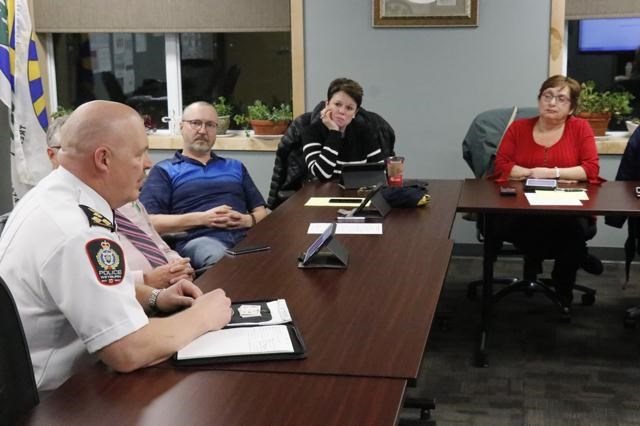Students in the southeast area, in Weyburn, Estevan and from surrounding communities, will be hearing presentations on “sexting” and on bullying this spring, with the partnership of the Weyburn and Estevan Police Services.
An update on these plans, and on policing issues such as the upcoming legalization of marijuana for recreational use, was provided to the trustees of the Holy Family Roman Catholic Separate School Division by Weyburn Police Chief Marlo Pritchard at their monthly meeting on Wednesday.
Education is a major key to helping the police provide protection and enforcement, chief Pritchard told the meeting.
“We can’t do policing on our own. I think the only way we can reduce crime and the impact of victimization, and give our children and youth opportunities to succeed is through increased education,” he said.
The Weyburn and Estevan Police Services will be working with both Holy Family and the Southeast Cornerstone school divisions in providing information on “sexting”, which involves children and youth sending inappropriate text messages and photos with their smart phones. There are children as young as Grade 4 who have been receiving some of these messages, said chief Pritchard.
The police are seeking to talk to the students about these kinds of communications, as well as who they should talk to if they receive such photos or texts or are being harassed.
Education director Gwen Keith said one of the results of this presentation will be disclosures of incidents from children.
“We do have a plan in place for these disclosures. One of the keys to that will be the counselors who will be available,” said the police chief.
The police are also putting on an anti-bullying presentation with a police officer from Calgary, Tad Milmine, for Grades 6-11, and a “Kids on the Block” puppet presentation from Regina for Grades K to 5.
“We’ll be talking about bullying for the rest of the school year, and sitting down with your staff to talk about it. It won’t be just a one-time thing,” said chief Pritchard.
Asked about some of the issues the city police are dealing with, the chief noted that Weyburn’s “The Ride’s On Us” program has been successful in dealing with impaired driving, and will be extended until summer.
In looking at statistics for the first six months of the program, he estimates impaired driving charges have been reduced by 50 per cent, and provincially charges have declined by about 30 per cent, with a significant reduction in traffic fatalities in 2017 around the province. The police chief pointed out that the police are still dealing with impaired driving charges for those aged between 40 and 60, as well as with those in their 20s.
This has been a focus also of the Combined Traffic Safety Unit, which also involves the Estevan Police Service and the RCMP detachments in the area.
“The message is getting out there. I just hope it continues to help reduce the number of impaired drivers. It has a huge impact on the lives of families in the community,” said the police chief.
With the upcoming legalization of marijuana, the police have been preparing as best they can, but until the final legislation about the recreational use of marijuana has been passed by the federal government, the police are unable to finalize their plans for enforcement, such as of drivers impaired by the drug.
The police are also dealing with the potential impact on workers who will use marijuana, he added, as they consider “how do you deal with it.”
He noted that the Sask. Liquor and Gaming Authority will be regulating the sale of marijuana, with two licensed establishments to be allowed to set up in Weyburn. The problem police will have is if they allow people to grow marijuana in their homes where its production will not be regulated at all, in addition to the challenges of being able to enforce the law on impaired driving for those impaired by the drug.
“I’m sure we’ll get there, but we’re not there yet,” he said, pointing out this will be a major shift for those in law enforcement, after so many years of charging people for selling and producing marijuana as an illegal drug.
One of the issues that school boards are looking at dealing with along with the police and other agencies is absenteeism from schools.
“We’re looking at what role the police can play in all this,” said Keith.
“It’s a work in progress,” replied chief Pritchard. “It’s very complex. It was an eye-opener to me about how big a problem it is. Hopefully we’ll find a solution. No doubt we will, but it will take some time to work it out.”
Board chair Bruno Tuchscherer said he likes to see programs that bring police officers into the schools. “We want students to know the police as a friend, not as an enemy,” he said.
“The partnership with Holy Family just makes our job so much easier,” said chief Pritchard.



